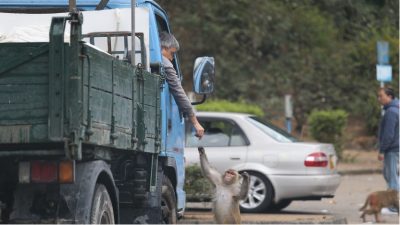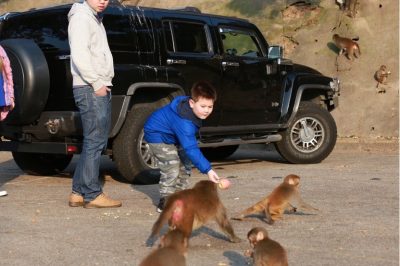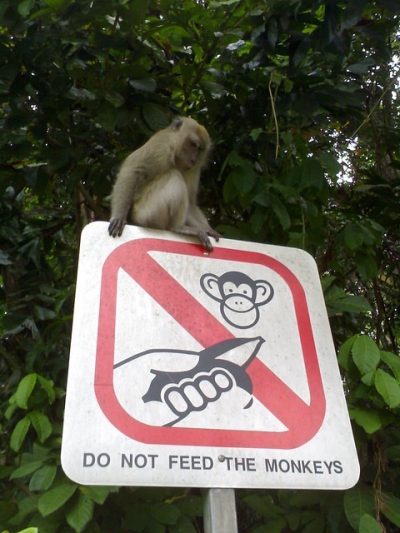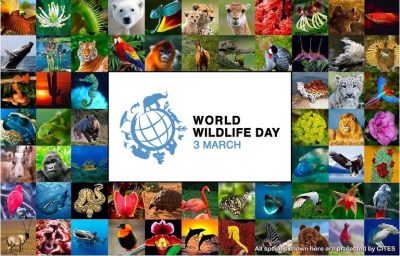Feeding Monkeys: Bringing Harms to Sustainability
In recent years, under the background that sustainable development has become a global strategy, it is increasingly urgent to study the effects of human behaviors. And feeding wild animals is one of the ecologically impactful human behaviors. I believe that when you pass by parks and zoos, you will see signs that say, “Do not feed wild animals”. In my hometown of Hong Kong, feeding monkeys is very common.
Last month, a sunny noon, my dad drove me to Jinshan Country Park in Hong Kong where is a mountain full of monkeys living. Many citizens could be seen feeding the monkeys nearby. Some of them rolled down their car windows and threw the food to the monkeys, while others took a bag of food to attract the monkeys to take photos. And we just sat in the car quietly admiring the monkeys, but the following bad encounters made me reflect on the ecological impact of these human actions.

photo from https://www.hk01.com/.
I went out of the car to go to the bathroom. Suddenly, there was a group of monkeys rushed to me because they smelled the bread inside my handbag, they tore my handbag, took the bread, and left. Luckily, my dad arrived just in time to chase the monkey away and I wasn’t injured. But my bread was graded by them. People around me seemed to have grown accustomed to this sight and continued to defy fines and bans and blatantly feed the monkeys. Many parents even brought their children to feed the monkeys. Later, a gentleman came over and asked if we were hurt. He said that he has been feeding the monkeys for over a year. He’s just worried that the monkeys won’t have food in the cold weather, so he occasionally drives his private car and buys some fruit to feed them. At that moment, I was just frightened by the monkeys that I didn’t say anything to stop his behavior and watched him left and continued to feed the monkeys, which made me wonder if I should here do something to change this social problem.

photo from https://www.hk01.com/.
Why people breaking the ban to feed the wild animals?
It seems that people around me like feeding wild animals. This is already a social phenomenon. I have observed people feeding animals constantly in many places in Hong Kong. With the social nature of pets gradually replacing the nature and original responsibility of animals, human beings begin to shoulder the responsibility of caring for animals and subsequently acquire more social labels on their own personal manifestations, For example: loving, rich, attractive, etc. It is because of the lack of knowledge and publicity in the society. For example: The man I met in Jinshan Country Park, he didn’t have enough knowledge about wild animals and mistakenly thought that feeding them was loving them. The government only bans the feeding but does not promote correct concepts to the public, so that citizens do not know that their wrong love will contribute negative impacts to sustainability.

photo from CC BY-NC.
What are the negative impacts of feeding wild animals on sustainability?
First, for the impacts on wild animals’ sustainable development, once wild animals are over-reliance on artificial feeding, they may lose part of their ability to forage in the wild and reduce their vigilance to humans. In addition, human food is processed through processing which may lead to high cholesterol and nutritional imbalance in wild animals, making them prone to infectious diseases and rapid spread among animals.
Secondly, in terms of environmental pollution, people feeding animals by spreading fodder everywhere and throwing breadcrumbs in the air, but these foods cannot be completely eaten by wild animals, and can easily contaminate the soil and water sources, bringing harms to the environmental sustainability. In the Jinshan Country Park, I can see that there are food scraps all over the place.
Thirdly, for the harms of humans, this also contributed to the animal’s behavior of attacking humans, as they saw humans have food, they thought it was for them and grabbed the food, just like I was attacked by the monkeys.
The negative effects of feeding wild animals often take a long time to observe as human understanding of wild animals is still very limited, resulting it become a wicked problem in Hong Kong.
So, what are the solutions?
I think that to improve this wicked problem, each of us must make some small changes to create a big result. Don’t think that the changes you have made are insignificant. Here are the changes I think each of us can make. If you are confused about this topic, you can refer to some of my suggestions.
- Stop suspicious feeding behavior
If you pass by a country park and see someone feeding animals, you can persuade people’s feeding behavior on the spot and tell them about the impact of these behaviors. If they don’t listen to the advice, you can call the Fisheries and Farmers Department to stop them.
2. Participate in the ‘Stop Feeding Wildlife Program’
In Hong Kong, environmental groups run a ‘Stop Feeding Wildlife Program’ to raise public awareness and encourage respect for wild animals. We can actively participate in tours and educational booths of these programs to effectively understand the natural behavior of wild animals and the importance of not feeding them. You can also share these activities with friends and if you are a parent, take your children to participate to educate the next generation, let them develop a correct concept from an early age.
3. Donate to conservation groups that protect wildlife
As a small force, we can also donate money to environmental groups through various channels such as the internet to support them in holding a series of activities, lectures and communities that prohibit the feeding of wild animals to maintain sustainable wildlife development in our living place.
Sustainability is in our hands!

photo from CC BY-NC-ND.
